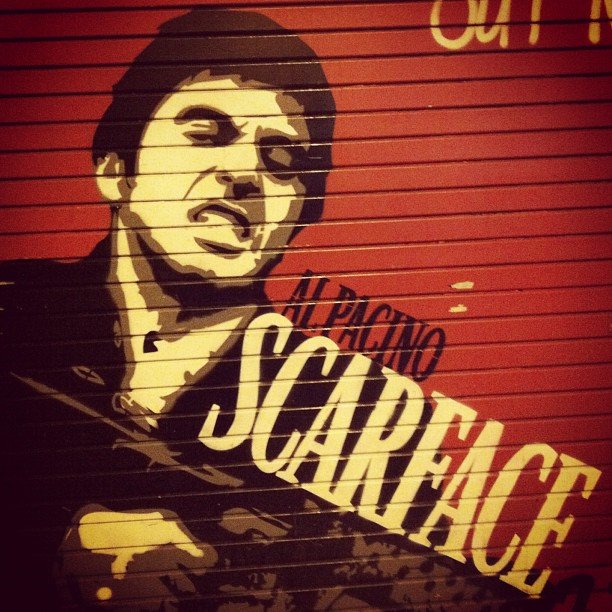Hi everybody. Let me start by saying that I'm not incredibly well-educated in politics or economics, and it might show in this post. But I'm not a total idiot, either. I should also mention that I haven't done any after-the-fact research, and this post is based entirely on my thoughts and feelings after watching the film last night, and whatever information I may have absorbed in my life prior to that.
So, as I mentioned, I watched Scarface last night.

It's not the first time I've seen this film, but it is the first time I've seen it in quite a while, and the first time I've seen it after making a number of changes in my life that, let's just say, allow my brain to function significantly better than it used to. So the story and the points it may have been making were more readily understandable to me.
I was particularly interested in posting my thoughts here because I've noticed there are a lot of people here who are interested and apparently educated in various political and economic systems, and have a lot of opinions in those arenas. I have my own feelings, but I'm not necessarily going to explore those here; I'm more interested in what some of you folks think or know.
At a basic level, I think this film is about communism and capitalism. It seems to me to be clearly not in favor of communism (perhaps anti-communist), but it also doesn't seem to favor capitalism too highly. The character of Scarface apparently hates communism, saying he "kill(s) commies for fun," (if I remember correctly) and remarks multiple times about how he hated being told what to do and having little freedom in his communist homeland. But he doesn't seem to fare any better in the capitalist society of the States. He completely self-destructs with his freedom (granted, he wasn't playing by "the rules," but law enforcement didn't stop him, and in the end, it was a fellow crime lord who ended him), and he destroyed everybody around him, including his family. He was motivated largely by greed and the love of money and power. Although, I certainly did feel some sympathy for him in trying to help his family, and I appreciated his early comments about his initial crime boss letting the drugs and alcohol do his thinking for him. Despite being a murderous criminal, he had some decent enough motivations and was not without certain respectable ideas about hard work and self-respect, and even certain endearing sentiments about love and starting a family. And I'll admit, I loved seeing him quit his dishwashing job and go pursue his dreams (such as they were). Obviously, in the end, he was crushed by overwhelming greed and luxury and power and drugs and paranoia and all the rest. Even in those final days, though, he had some insight, remarking to his friend and, er, coworker, that he felt they had lost their hunger.
I'm not entirely sure what my point is, honestly . . . I'm in a state personally where I am exploring a lot of new thoughts and feelings about politics and economics and culture(s) in general, and this film touched on a lot of those thoughts and feelings and inspired a lot of questions. I appreciate that the film didn't seem to be heavy-handed in any particular direction (so far as I can tell) and told a moving story about a lot of different things, including things I haven't touched on here. I think it's a great work of art. Again, I have my own personal feelings and political/economic leanings, but I want the views and opinions of other people, people I may or may not agree with, people who likely know more than I do, and particularly in a community as unique as this.
So, if you are so inclined, let me know your thoughts and views. Thanks.
(Image borrowed from Ian Stannard's flickr [https://www.flickr.com/photos/silly_little_man/7479011318/in/photostream/] under a Creative Commons Attribution-ShareAlike 2.0 Generic (CC BY-SA 2.0) license.)
I kill a communist for fun, but for a green card, I gonna carve him up real nice.
Thank you so much for that thoughtful reply. I really appreciate it. I was beginning to think it wasn't going to get any kind of reply (which I would have accepted, of course; just would've been a bummer). Interesting, too, to get the perspective of someone who grew up in the time and place the film depicts.
I rewatched certain portions of the film last night . . . I was grabbing some audio samples, actually, to potentially use in some music. (Not hip-hop, heheh.) And one scene in particular reminded me of other aspects of Tony Montana and causes me to definitely agree with you when you say he wasn't motivated by greed. The scene at dinner with Manny and Elvira, where Tony complains and wonders, "Is this it? Is this what I worked for?" All the excess and all the drugs and the "fucking and sucking" etc, and he complains about not being able to have a child and so forth. Then Elvira leaves him, and he leaves the restaurant pointing out the hypocrisy of everyone there and that they all need a villain like him. I think that's my favorite scene in the film. So yeah I agree with you that I don't think he was motivated by greed, at least not entirely. And that he took a route that screwed him and those close to him out of everything he actually wanted. He could have stayed at the restaurant (and so forth), but I don't know if that would have gotten him what he wanted either. Like anything real, there isn't really a simple answer. I think you're right on target with your reply though. I have to go; otherwise I'd write and ramble on more! But thanks again for your great reply, much appreciated.